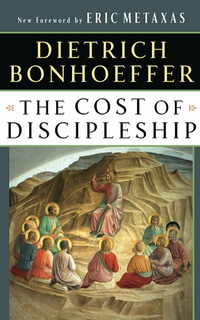Mentions
- Post
"By willing endurance we cause suffering to pass. Evil becomes a spent force when we put up no resistance. By refusing to pay back the enemy in his own coin, and by preferring to suffer without resistance, the Christian exhibits the sinfulness of contumely and insult. Violence stands condemned by its failure to evoke counter-violence. When a man unjustly demands that I should give him my coat, I offer him my cloak also, and so counter his demand; when he requires me to go the other mile, I go willingly, and show up his exploitation of my service for what it is. To leave everything behind at the call of Christ is to be content with him alone, and to follow only him. By his willingly renouncing self-defence, the Christian affirms his absolute adherence to Jesus, and his freedom from the tyranny of his own ego. The exclusiveness of this adherence is the only power which can overcome evil."

- Post
"In this question of truthfulness, what matters first and last is that a man's whole being should be exposed, his whole evil laid bare in the sight of God. But sinful men do not like this sort of truthfulness, and they resist it with all their might. That is why they persecute it and crucify it. It is only because we follow Jesus that we can be genuinely truthful, for then he reveals to us our sin upon the cross. The cross is God's truth about us, and therefore it is the only power which can make us truthful. When we know the cross we are no longer afraid of the truth.
There is no truth towards Jesus without truth towards man. Untruthfulness destroys fellowship, but truth cuts false fellowship to pieces and establishes genuine brotherhood. We cannot follow Christ unless we live in revealed truth before God and man.”

- Post
“But in the passion Jesus is a rejected Messiah. His rejection robs the passion of its halo of glory. It must be a passion without honor. Suffering and rejection sum up the whole cross of Jesus. To die on the cross means to die despised and rejected of men.”
“… a suffering Messiah was a scandal to the church… that is not the kind of Lord it wants, and as the church of Christ it does not like to have the law of suffering imposed upon it by its Lord.”
“To deny oneself is to be aware only of Christ and no more of self, to see only him and who goes before and no more the road which is too hard for us. “
“… for the cup of suffering will indeed pass from him — but only by drinking it. That is the assurance he receives as he kneels for the second time in the garden of Gethsemane that suffering will indeed pass as he accepts it.”

- Post
“The baptized Christian has ceased to belong to the world and is no longer its slave. He belongs to Christ alone, and his relationship with the world is mediated through him.
In baptism, a man dies together with his old world.
The old man and his sin are judged and condemned, but out of this judgement a new man arises, who has died to the world and sin.
Baptismal death means justification from sin. The sinner must die that he may be delivered from sin.
Forgiveness of sin does not mean that the sin is overlooked and forgotten, it means a real death on the part of the sinner and his separation from sin. But the only reason why the sinner’s death can bring justification and not condemnation is that this death is a sharing of the death of Christ." - Dietrich Bonhoeffer
Page 231-232


- Post
"By judging others we blind ourselves to our own evil and to the grace which others are just as entitled to as we are.
But in the love of Christ we know all about every conceivable sin and guilt; for we know how Jesus suffered, and how all men havé been forgiven at the foot of the cross.
Christian love sees the fellow-man under the cross and therefore sees with clarity.
If when we judged others, our real motive was to destroy evil, we should look for evil where it is certain to be found, and that is in our own hearts.
But if we are on the look-out for evil in others, our real motive is obviously to justify ourselves, for we are seeking to escape punishment for our own sins by passing judgement on others, and are assuming by implication that the Word of God applies to ourselves in one way, and to others in another.
All this is highly dangerous and misleading. We are trying to claim for ourselves a special privilege which we deny to others." - Dietrich Bonhoeffer
